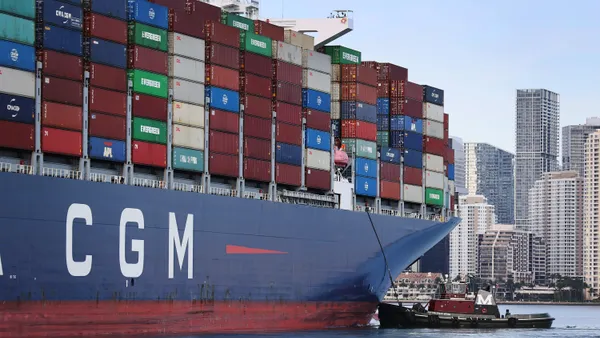Dive Brief:
- Investment in Hong Kong's warehouse, cold storage, logistics and data center markets fell 52% in Q3 year-over-year amid worsening civil unrest and reduced domestic consumption, according to a report from the South China Morning Post.
- The value of investment in the market fell to $719.9 million, according to data from Real Capital Analytics cited in the report, down from $1.5 billion during the same period in 2018.
- Hong Kong's economy has entered a recession, contracting 3.2% from last quarter amid business and cargo disruptions due to the political protests and the impact of the U.S.-China trade war. It is the lowest level of economic growth Hong Kong has seen since the 2008 recession.
Dive Insight:
In addition to shutting down major streets and public transport, the protests, which began in June, have impacted Hong Kong's airport, delaying passenger planes and the air cargo often loaded in them.
To compensate, shippers can explore transferring passenger cargo to freighter planes, however that can strain carrier capacity and result in higher prices and/or cargo rolling.
While air cargo has taken the brunt of the slowdown, amid a global contraction in the industry, ground freight has been impacted, as it has gotten harder for trucks to pick up cargo from the air hub and transport it inland.
Because of the difficulties in freight transport, supply chains see Hong Kong as presenting challenges for their logistics, thereby decreasing the desire for warehouse investment. In addition, Hong Kong's domestic constraints on warehouse construction, and a poor investment outlook, could influence the availability of future inventory storage space.
Vacancy rates in Hong Kong's warehousing stock is low at 1.7% of its 2 million square foot supply, the lowest vacancy rate the region has seen in five years, according to the South China Morning Post's report. This is in part due to government regulations that encourage the conversion of industrial buildings for commercial or residential use, versus the construction of facilities, thereby limiting the availability of new real estate.
The slide into recession amid political upheaval has analysts pessimistic about Hong Kong's economy. "Any recovery will be constrained by weak business investment, however, as the city's political crisis has done lasting damage to its reputation as a stable and autonomous financial hub," according to a research note from Capital Economics obtained by Reuters.















